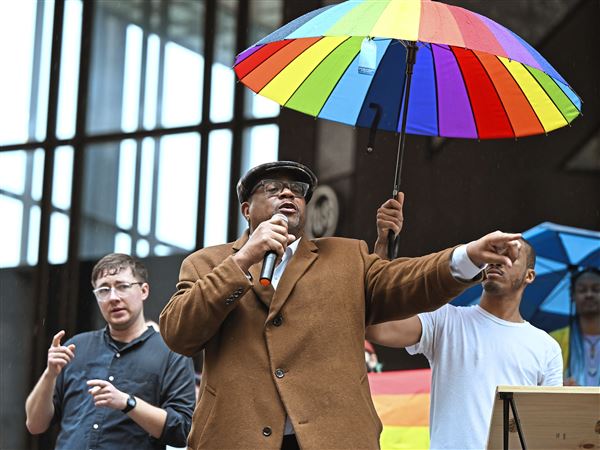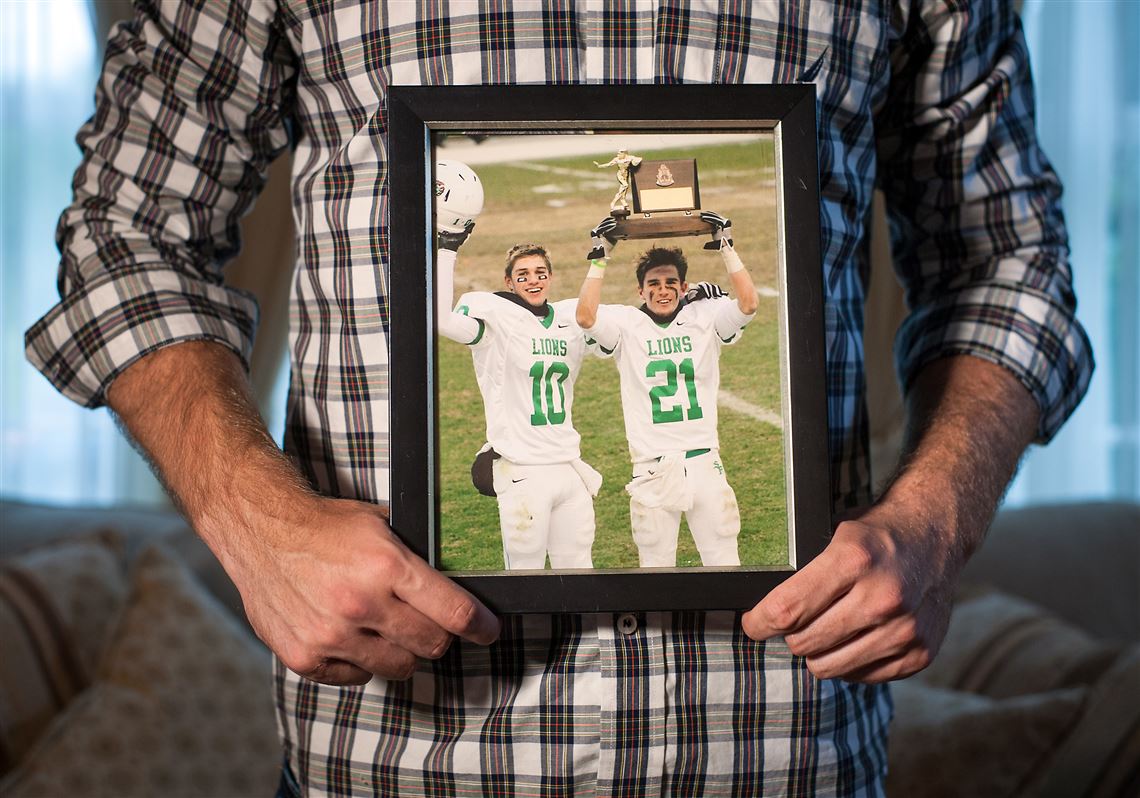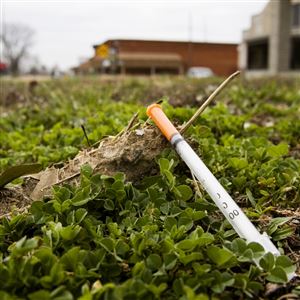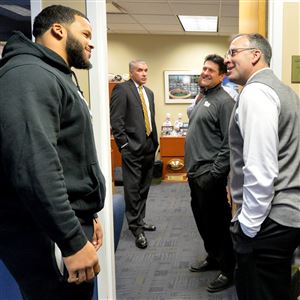Zach Challingsworth wakes up each morning to the sight of a black-and-white photo that takes up nearly an entire bedroom wall, one of the last photos he has with his big brother, Tyler.
That’s the memory, the two tailgating before a Kenny Chesney concert at Heinz Field, Zach doesn’t want to forget. The brothers are smiling. Wearing sunglasses. Each has an arm around the other’s shoulder.
It’s a much better image than the one Zach can’t get out of his mind.
Tyler was blue in the face when Zach and his dad walked into his bedroom in January. His mom frantically dialed 911, but she was too upset to talk. Tyler survived that overdose, and quickly left for a rehab center in Florida. It was the last time Zach saw his older brother.
One month later, Tyler overdosed again and died before his family could reach the Florida hospital. He was three weeks away from his 24th birthday.
Tyler and Zach didn’t have too many pictures together in recent years as heroin tore down Zach’s only sibling. That’s why Zach clings to this one — just the two Challingsworth boys, both former standout wide receivers for South Fayette High School, with the words “Forever Brothers” in the bottom right corner.
Tyler’s family and friends likewise want to preserve their memories of a promising life before addiction destroyed it. But they also want to tell his story. The ups, the downs, their jarring revelation that a standout athlete with a passion for music and a “good life” could get so lost.
“We don’t understand,” his mother, Betsy, said sitting next to her husband, Dave, at the family’s pristine home in South Fayette. “That’s the same question you would ask somebody who commits suicide. Why would they do that? There’s something inside of you, like you can’t see what everybody else sees.”
Catching on
Tyler Challingsworth was maybe 5 feet 10 and a whopping 120 pounds when he entered high school in 2007, but that didn’t stop him from starting right away on South Fayette’s defense. His stature did get him a nickname, “Smurf,” that stuck throughout his career.
But he earned another moniker, too, while helping to set the tone for a burgeoning WPIAL football program. His coaches started calling him “Warrior,” a testament to his toughness.
“To put it fairly,” Zach said, “he was a badass in high school.”
Tyler’s brother would know, given that Zach grew to 6-2, 185 pounds, and accepted a scholarship offer to play college football at Pitt. “Smurf” grew too, a couple more inches, and he put on about 40 more pounds. Not the kind of size his big little brother had to work with, but he still led South Fayette in receiving with 72 catches for 1,052 yards and nine touchdowns as a senior in 2010.
Zach also caught more than 40 passes that season, with 13 touchdowns, as South Fayette made it to the state championship after winning the school’s first WPIAL title since 1964. Tyler and Zach scored the only two touchdowns in that 19-6 win over perennial power Aliquippa at Heinz Field.
“As a parent, it was the best times of our lives,” Betsy said. “Their grandparents went to everything. David’s dad was dying of lung cancer but came to every game, even in a wheelchair, because it just motivated him so much to see the boys playing together. It certainly was a special time.”
It almost didn’t happen. Most people don’t know Zach considered quitting football in eighth grade to focus on basketball, but his brother wouldn’t let him.
Tyler took one set of football pads into their backyard — they weren’t for him — ran around and made Zach tackle him over and over and over again.
“He instilled that mindset into me that no one can be better than you,” Zach said. “It wasn’t cockiness, it was confidence. I learned from him to play the game.”
Bouncing around
If Tyler Challingsworth had his younger brother’s height, Division I schools would have been all over him, Zach insisted.
“He would’ve been a better player than me,” Zach said. “100 percent.”
 Tyler Challingsworth starred on offense and defense at South Fayette. (Lake Fong/Post-Gazette)
Tyler Challingsworth starred on offense and defense at South Fayette. (Lake Fong/Post-Gazette)Instead, Tyler opted to play college ball at a lower level, accepting an offer from nearby Washington & Jefferson. It was a chance to continue his career and room with his best friend Jeff Davis, South Fayette’s starting running back.
They both got the chance to play a little bit as freshmen, but not much. Tyler decided he didn’t love football enough, so he left the team and, eventually, the school.
He bounced around from there, briefly attending community college, living and studying at Edinboro, then IUP. But he never graduated, 12 credits shy of a business degree his parents urged him to get.
As Tyler struggled to find his place, Zach started to climb the depth chart at Pitt. By 2014 he was putting as much time into football as ever while his parents attended every game. Tyler made it to Heinz Field or went on a road trip as often as he could, proud on the inside but reluctant to express it.
“He wouldn’t want me to see it,” Zach said with a smile, “but then I would get Snapchats of him wearing my jersey around the house.”
Tyler’s post-high school instability is one reason friends and family think he might have started to change the way he viewed himself.
Academics weren’t much fun for him, so he didn’t always apply himself. He managed to pull Bs and Cs, his dad said, but Tyler wasn’t the type to put his energy into something that didn’t intrigue him. Transferring schools also didn’t seem to help, slowing his progress as others passed him by.
But he was passionate about music. Nowadays, it’s Zach who wears the proud brother hat when he shows off some of Tyler’s work. He taught himself how to play acoustic guitar, wanted to be a producer, created his own beats and even had some rappers inquire about purchasing them. It was a lot more fun to him than business classes.
“We’d look at him and say, ‘Oh my God, you’re so talented,’ ” Betsy said, “and he looks at himself and says, ‘Wow, I don’t ever do anything right.’ ”
The Challingsworths still aren’t sure how Tyler grew addicted to heroin. He always wanted a tattoo, but was scared of the needle. He was a germophobe, so the thought of a syringe in his arm makes no sense. Tyler started using Oxycontin recreationally, then searched for a new high. From what Tyler told them, he tried heroin for the first time two years ago and hid it from his family for about a year.
“There’s a misconception that people maybe start using drugs or try drugs to have fun, to get high,” Betsy said. “But most of the time — if not all of the time — it is because you have a pain that’s inside of you and you will do anything to get out of that darkness.”
Where that darkness came from for Tyler is hard to fathom. They knew he was depressed, knew he struggled with self-esteem, but couldn’t and can’t figure out how it would be so bad that he would turn to the drug that eventually killed him.
“It affects people differently,” Betsy said. “And for Tyler, it was all-consuming.”
Spiraling down
Home early from work one day last June, Dave picked up a letter in the mail from Allegheny County’s court system, one Tyler probably hoped to intercept himself. Their oldest was caught with possession of heroin.
“It was devastating,” Betsy said. “You can’t even imagine. I believe I just fell to my knees, because what else do you do? You can’t even comprehend that someone you gave birth to, that someone you have raised to the best of your abilities, chose to do something so harmful.”
From there, it was about trying to get him help. It was about trying to keep that burden from his younger brother, Zach, about concealing it from friends, family, the world.

Zach Challingsworth holds a photo of him and his older brother, Tyler, right, from their days playing football together for South Fayette High School. (Stephanie Strasburg/Post-Gazette)
Dave and Betsy have some regrets about the first steps they took with Tyler — “hovering” is how his mother puts it now. Endless questioning every day was their natural response as parents. Confiscating his cell phone seemed to make sense, but only secluded him more. Looking back, they’d react differently in some ways, but they never stopped loving him and did the best they could.
“It was a tough year,” Dave said. “A long year.”
Soon enough, it was Zach’s burden, too.
The brothers were home alone last year when Zach noticed Tyler had been in his room for a long time. Zach went upstairs, and the door was locked. He pounded on it, telling Tyler to answer, but got nothing. Finally, he picked the lock and went in. Tyler was hunched over on the other side of his bed, barely able to pick up his head and look over at Zach when he shouted his name.
“He had no idea where he was,” Zach remembered. “Me, I felt like I gave up on him at that point. … I think I called him a dumbass, said some other choice words to him. I went over and shook him, he looked up at me, and I was mad.”
Zach didn’t actually see his brother with a needle that day, but he didn’t have to. At the time, maybe he was too naive to admit that it was heroin that put his brother in that stupor. Soon enough, it was a scene he saw over and over again — one he can’t get out of his mind.
“I had seen him do so many things that it was just like, ‘How can you keep doing this to yourself, knowing that we care about you, and you’re going to lock yourself in your room and do this?’ ” Zach asked. “It wasn’t him. It was the drugs that made him do that. It was hard to talk about, then I realized we had to talk about it.”
The Challingsworth brothers were never ones to have deep, thoughtful conversations. They’d call each other up and talk about Zach’s Pitt games, sure, but never any substantial one-on-one discussions, just brother to brother. At least not until Zach realized the magnitude of what Tyler was up against.
First, it was anger. Not so much at his brother, but at his parents for keeping his secret. Zach didn’t talk to them for about a month, a decision he now calls stupid because he could’ve been trying to help in that time.
“We wanted to protect Zach,” Betsy said.
And that came from Tyler. He was embarrassed, worried his brother would think less of him. The first few times Zach broached the subject with him, he lied about it. Eventually, he couldn’t lie anymore. Zach went online to find the drug charges, the DUI, and showed them to Tyler, who couldn’t explain away his criminal record.
 Zach Challingsworth makes a touchdown catch on the road against Duke in 2015. (Lance King/Getty Images)
Zach Challingsworth makes a touchdown catch on the road against Duke in 2015. (Lance King/Getty Images)Once Zach fully realized what was happening at home, he made some sacrifices. He stepped away from football, in large part to spend more time with Tyler and his parents. Eventually, he decided he was done for good, getting a job instead of pursuing a final season of eligibility at Pitt or elsewhere.
Some of the only good that came out of Tyler’s decline in the last three months of his life were his conversations with his brother.
“Tyler always talked about how proud he was of Zach,” Betsy said, her voice wavering. “He did say the only thing that I can be proud of in my life is that the mistakes I made, Zach will never make.”
The last time Zach talked to Tyler was the Wednesday before he died. He called from the treatment facility in Florida, where he agreed to go after that near-fatal overdose in January. Tyler disliked flying, but hoped a change of scenery would help. He tried rehab before, at a place in Washington County. But after a few months, Zach noticed Tyler stopped wearing his bracelet celebrating each new milestone of sobriety.
Tyler told Zach he was excited, feeling really good, like he could finally talk to people about his struggles. And that he wrote down his life story, and once Zach read it, he’d realize some of what Tyler said and did in recent years was the heroin, not him.
“We were close, but we never really shared our emotions. He told me he loved me, I told him I loved him back, and that was the last thing we ever said to each other,” Zach said, his eyes welling. “And we never said that. Ever. So it’s kind of like a bittersweet thing that we actually had that moment. I’ll never forget that.”
Moving forward
Dave and Betsy were at their Conneaut Lake house the day they got the call. Zach had just talked to his dad on the phone, so he knew something was wrong when Dave called back so quickly.
Tyler overdosed again. They had to get to Florida as soon as possible.
Details of Tyler’s death remain scarce. The family doesn’t know who supplied him with heroin or how it got in the rehab center. The Challingsworths continue searching for closure they might never have.
One of the hardest things for the family was sharing a secret they tried to hide from the world.
“It was making those hard phone calls, and telling people what happened,” Betsy said. “Friends assuming he had been in an accident or something, and us having to say the words, ‘He died of a heroin overdose.’ It’s so hard — hard to catch your breath.”
The Challingsworths weren’t sure how they’d make it through Tyler’s birthday three weeks later, but his friends came over for pizza and stories about the good times. That’s when they realized this must be their chance to somehow try to make a difference.
“You can’t come to terms with it, really. You just have to, as he always used to say, keep on keepin’ on,” Zach said as his father wiped away a tear. “You’ve just got to keep moving forward. It’s never going to be OK that he passed away, but you just have to live your life, and he would want us to do that.”

Dave, Betsy and Zach Challingsworth stand in front of their South Fayette home with a portrait of Tyler. (Stephanie Strasburg/Post-Gazette)
He may not have wanted a golf outing in his honor — they all laugh at how much he hated that sport — but July 15 at Quicksilver Golf Club will be the inaugural event for the Tyler Challingsworth Foundation of Hope. Part of the proceeds will go to a yearly scholarship for a South Fayette football player; a portion to homeless shelters and food pantries because Tyler was always asking friends if they were hungry when they came over; and the biggest chunk to facilities that help people with addiction. Registration closes June 30, and those interested can contact Zach at 412-722-8635.
The Challingsworths took a big step this month when they finally opened the door to his room, where his clothes are still folded on his bed.
“I still have my times where I don’t believe it happened. I still feel like he’s going to come back. To me, it doesn’t seem real on some days. But some days, I’ll hear a song he used to play on guitar and it hits me, like, yeah, he’s never coming back. I don’t have a brother anymore,” Zach said, fighting back tears. “But then I feel like the next day, he could still come back, because I haven’t seen him in so long. So I just keep wishing that one day he’ll show up. But he’s not going to.”
His room is always open now. They can look at the plaques celebrating his football accomplishments. His snowboard hangs above the headboard, on the wall opposite the tickets he saved from Pitt games. There’s his guitar, his coin collection.
Not a day goes by that Zach doesn’t think about his brother. They had some big plans of places to go, things to see that they’ll never get to do. He hangs onto those in-between moments for Tyler, the better days when he was himself again. And he looks at that picture in his room, a constant reminder of who Tyler was and a constant reminder that he's not here.
“There’s no way around it,” Zach said, “but I’d rather look at that and be happy than not look at anything and forget the good memories that we had. So every time I go to bed, every time I wake up, I get to see him.”
Brian Batko: bbatko@post-gazette.com and Twitter @BrianBatko.
First Published: June 23, 2017, 1:58 p.m.



















